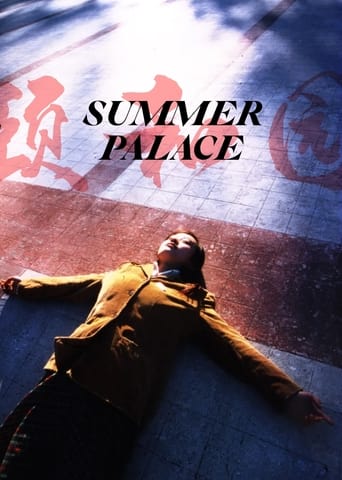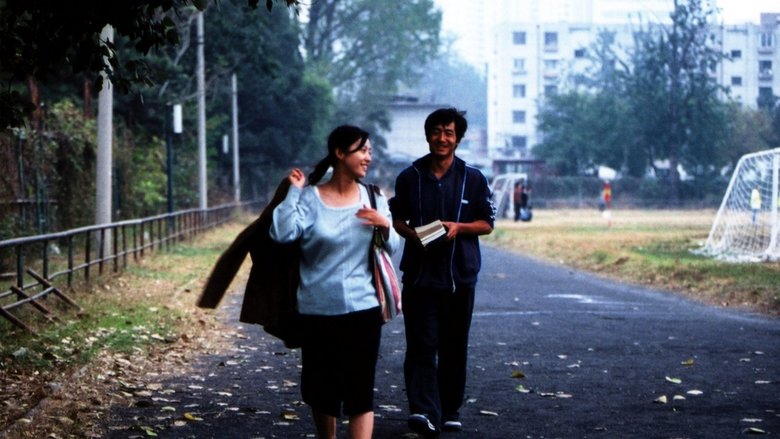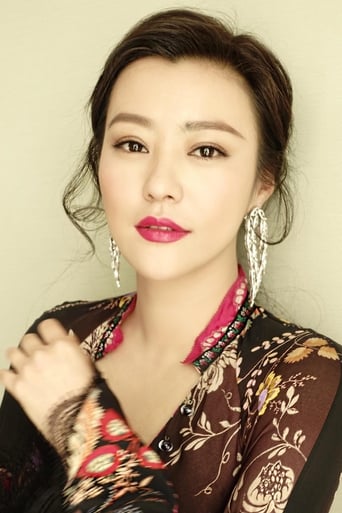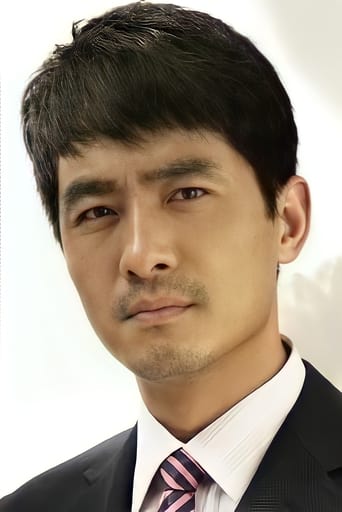

Summer Palace (2006)
Country girl Yu Hong leaves her village, her family and her lover to study in Beijing. At university, she discovers an intense world of sexual freedom and forbidden pleasure. Enraptured, compulsive, she falls madly in love with fellow student Zhou Wei. Driven by obsessive passions they can neither understand nor control, their relationship becomes one of dangerous games - betrayals, recriminations, provocations - as all around them, their fellow students begin to demonstrate, demanding democracy and freedom.
Watch Trailer
Cast


Reviews
One of my all time favorites.
An action-packed slog
It was OK. I don't see why everyone loves it so much. It wasn't very smart or deep or well-directed.
A film with more than the usual spoiler issues. Talking about it in any detail feels akin to handing you a gift-wrapped present and saying, "I hope you like it -- It's a thriller about a diabolical secret experiment."
I really wanted to like this fictional movie from director Lou Ye. After all, I can understanding that falling in love is indeed strange, confusing, and beyond anybody understanding, besides the lover, but after watching this movie, I can say, this movie is not watchable. It's just too bland and somewhat unpleasant. We get it, Lou Ye! Falling in love and living in Communist China is indeed misery. I don't think, a highly repetitive movie with no character development about the passionate but volatile love affairs of an unstable young woman, Yu Hong (Hao Yei) was needed. After all, dealing with real-life is depressing enough, so why the audience waste time, watching more of that negative BS in reel-life. Don't get me wrong, I was going to stand by this movie, even if I'm going to stand alone, if the character disaffection with society and her use of sex as a substitute for contentment, led somewhere. Sadly, it does not. In the end, the movie about a woman's self-reflection on why she couldn't comfort in the arms of different lovers led nowhere, and was pretty much pointless as it didn't solve any of her mental problems. It doesn't help that the tone for this film really horrible. Barely any scenes that seem lovely, even when Hong isn't crying or being overdramatic. It doesn't help the audience that the sex scenes are not made to look romantic at all, with the undifferentiated partners, barely haven't any stimulation, while going at it. For a film to be one of the first from mainland China to feature the full-frontal adult nudity of both its male and female leads; it just felt too tame to care about their relationships. While, I have to say, Hao Yei is a great actress, the material that she was given, was just below average. Plus, it was a bit odd that Lou Ye pick Hao Yei, because she turn him down, fearing the sex scenes would hurt her love relationship. It's equally as weird as the entire crew had to waited patiently for Hao to accept, for so long that the original choice for Zhou Wei, Liu Ye, had to abandon the project. Hao was very touched by Lou Ye's actions and agreed, request to but her relationship with actor Deng Chao did end as a result. Still, I have to question if this was a great choice for Hao. After all, it's not really a realistic picture of the student life, here, because, all her character was doing was having sex and moaning about it. In my opinion, I think Lou Ye, pretty much exploit Hao Yei. Why, because ask yourselves, this, when did her character, get any time to study!? It doesn't help the movie that Hong's political views are never, truly explored as well. So, when the backdrop of the Tiananmen Square protests of 1989, came. It seem to come, out of the blue for Hong to want to join. Though footage of the Tiananmen Square demonstrations are indeed spliced in among the dramatized imagery. Seeing, how there was no appearance of Hong talking to any of the key student leaders, or her, at the Square, protesting. It felt like a waste of time. I get that, the political movement was no more than a momentary sensation hiccup for Hong as she go on with her alienated most self-centered live, but couldn't they portray it, better than, just a few brief sequence of Hong's friends checking out the streets, while Hong moans. Don't get me wrong, Hu Lingling & Guo Xiaodong were fine as Hong's friends, Li-Ti and Zhou Wei, but it was a really sad portrayal of key event in China history. It felt a little bit shoehorn, seeing how it barely affect Hong's life like the scenes in Germany. To add insult to the misery; the movie doesn't really do a good job capturing life in China during the Cold War at all. The clothes, the schools, and the sites, just doesn't look like 1980's Beijing. Perhaps, the most jarring thing in this film, has to be, hearing western style music in bars, where all the characters go to. I really doubt that. Another thing, that hurt this film for me, is how badly shot, it was. Hua Qing is a really bad, cinematographer. It was really blurry at parts, or way too pitch black. I can barely see, what's going on. Yet, another problem, this movie has, is really bad pacing with a 140 minute running time. It takes forever to get anywhere. Overall: I get that this coming to age movie was going for a French New Wave feel to it, with Hong, narrating her life in somewhat a poetic way, but I had to say, it kinda failed. It felt tame compared to other Western dramas from Cannes Film Festival, that year. It's just not as good as certain critics think it is. While, I do understand, why the Chinese government banned this movie, due to the sex scenes and political undertones. I just don't see, why people should still see this movie. It's just painful to watch. Sadly, because of that. I just can't recommended seeing.
Summer Palace is a politically charged drama from director Lou Ye.The movie features Hao Lei and Guo Xiaodong.The screenplay by Lou Ye, Feng Mei and Ma Yingli tells the story of Chinese political upheaval through the eyes of protagonist Yu Hong, who moves from her rural community to embrace life in Beijing. Spanning nearly 20 years, the film elucidates the mindset of the Chinese revolutionary youth during the 1980's and into the new millennium through its narration by Hong, who reads diary excerpts to set scenes.Yu Hong is a beautiful 17-year-old girl who is soon to leave the small border town where she was born and raised to attend college at Beijing University. Shortly before Yu Hong leaves for school, she gives her virginity to her longtime boyfriend, Xiao, and pledges to remain faithful to him. At Beijing University, Yu Hong makes friends with Li Ti,another girl dealing with a long-distance relationship, and meets Zhou Wei, a handsome student who soon steals her heart. Yu Hong leaves her relationship with Xiao behind to commit herself to Zhou Wei, and she's swept up by her feelings for him as they embrace the new social and economic freedoms which are being felt on campus. The empowerment felt by the students in Beijing comes to a head during a series of demonstrations in Tiananmen Square; the protests have tragic consequences, and the excitement of new possibilities gives way to a feeling of defeat. Yu Hong and Zhou Wei are separated and the heavy hand of the state is brought to bear on the rebellious students.The movie suffers from excessive length and inconsistent pacing.Also,one who does not speak the movie's language needs full concentration to follow what's happening in the plot and to get the message that it is trying to impart.But nevertheless,it manages to be a brilliant and excellent film encapsulates an important moment in Chinese history and will especially enlighten viewers to the nuances of people struggling for freedom.Aside from that,we get to see the coming-of-age and maturation of Hong as she gets exposed to the her world and the changes she undergoes in response to it.
First time to watch Ye Lou's movie, I think it's not a perfect film, but certainly it's a good one.He is good at depicting the love deep in the heart:the love with desire,contradiction,unfaith,loss and the future.The film can remind your past time while you were young,can make you miss your lost romantic, can make you think over the love,the youth.So, a beautiful love drama it is.I also have to mention this backdrop of the 6/4 incident happened in Beijing in 1989 in the movie,as I known, no other directors in China dared to take this backdrop in any movies up to now, so I respect Mr.Lou's courage. At last I think the best character in the drama is Li Ti played by Ling Hu .The flaw of the film is at the end when Yu Hong and Zhou Wei met, I think, the process is not very good.
When I saw Summer Palace, I assumed initially that the title referred to a building near Tiananmen Square. A quick Internet search, however, showed that this is not the case. The Summer Palace (Yihe Yuan, literally The Garden of Good Health and Harmony) is an elaborate structure and garden in the hills near Beijing that was originally the emperor's summer residence. After more web searching, I discovered from a comment by Agora on the Flixster Website (http://www.flixster.com/movie/573373022) that the grounds of the Summer Palace are the location of an "intimate bonding moment" between the two university students who are the film's main characters. They are Yu Hong, a girl who has recently come from the country, and Zhou Wei, a more experienced member of the student intelligentsia.All the same, I like the film's French title, Une Jeunesse Chinoise (A Young Chinese Girl) better. An esoteric but appropriate alternative would be La Française (The French Girl) in reference to Jean-Luc Godard's 1967 La Chinoise (The Chinese Girl). In Godard's film, a young French woman pretends to be a Chinese cultural revolutionary. In Summer Palace, a Chinese girl learns to pose as, among other things, a French intellectual.The movie is indebted to the French New Wave in other ways as well, including use of real urban settings, choppy editing, and lots of sex. The sex is different from what we're used to. It's neither pornographic nor romantic. There are nude bodies, primarily those of the attractive Yu Hong and her sexual partners, and they perform with graphic intensity. There is, however, neither stimulation nor foreplay. The partners are undifferentiated and their positions conventional (though a shift, in later episodes, from the missionary position to sex with the woman on top may have some significance).In other ways as well, I found it hard to relate to any of the movie's characters. Though they must all have worked very hard to be admitted to an elite Beijing university, there is no indication of their academic activities. A brief sequence of documentary footage shows the Tiananmen Square demonstrations and implies the subsequent massacre but there is nothing about planning or political intent. For the characters in the movie, political action seems no more than a momentary sensation as they go about their alienated lives.Maybe this indifference is an inheritance of the Cultural Revolution. Mao went to great lengths to deprive his subjects of personal identities, including, at one point, an effort to replace names with numbers as a means of identification. It's also possible that there are things in the movie that I, as an American, just don't get. Still, I can think immediately of two memoirs, Jung Chang's Wild Swans and Anchee Min's Red Azalea, that portray individual Chinese characters in depth and with great effectiveness. These are things that director Ye Lou is not able to accomplish.These comments should not be taken as excusing the Chinese government's banning Yihe Yuan from internal distribution and prohibiting Ye Lou from making films for five years. I asked the manager of the theater in which I saw the movie whether Lou had been imprisoned. "Not yet," he said. It should be kept in mind that the old men who still rule China have only been able to survive and prosper because they were once sycophants to the greatest mass murderer in human history.




